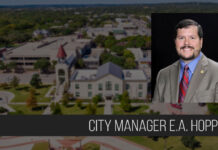Although Kerr County’s voter turnout was incredibly low, thanks in part to no other matters on the ballot other than Texas Constitutional amendment propositions, other nearby communities had some important local matters to address.
I found two elections that I think are useful for comparison to one of our local projects, the Holdsworth Drive Athletic Complex. Of course, our athletic complex, which is set to open this spring, was funded without ad valorem tax increases. Our complex was funded by a donation of $1.5 million in land and $3+ million in cash from the Cailloux Foundation, and $9 million from the Kerrville Economic Improvement Corporation (EIC) via 4b sales tax revenue. So Kerrville was not asked to raise taxes in order to pay for the soon-to-open complex — we were able to create a world class facility for our youth without asking taxpayers to foot the extra bill.
However, taxpayers in Gillespie and Val Verde Counties had to make a decision… Would they abide a slight tax increase to provide much needed athletic facilities for the area youth?
Gillespie County Sports Complex
A bond issue was on the ballot for Fredericksburg and Gillespie County voters. The proposition called for a $12.6 million bond for Oak Crest Sports Park, a 42 acre facility that would have included 6 lighted baseball and softball fields, 10+ soccer fields, playground, restrooms, and concession stand. The land was purchased by the city in the spring of 2017, and was not part of the bond proposition.
The repayment of the bond would have been funded by an approximately 3.5 cent tax increase per $100 property value. So, for a $300,000 home, about $105 dollars per year, or around $9 per month. Of course, because of the tax freeze for seniors, those over 65 with homestead exemptions would see no tax increase at all.
But the complex was a very dramatic topic in Gillespie County over recent weeks, and the issue ultimately failed on Tuesday by a margin of exactly 100 votes (767-667).
Val Verde County Sports Complex
Voters in Del Rio and Val Verde County considered whether or not to pass a $20 million bond issue that would fund the construction of a gymnasium, baseball and softball fields, soccer fields, and concession stand on a tract of land that was donated to the county for this purpose.
The bonds were to be paid for by a 5 cent per $100 increase in the property tax. A homeowner with a $100,000 valuation would see an increase of about $60 per year, or just $5 per month. (Property values in Del Rio are much lower, hence the reason supporters advertised what the increase would be for a $100k home.)
Supporters argued that a complex was needed to give the youth something to do in a community that had seen hard times in recent years. Opponents worried that if Del Rio continued to decline, that they might default on the debt.
On Tuesday, voters said “no thanks” to this project, and the bond issue failed by a margin of 66% to 33%, or about 800 votes.
What conclusions can we draw from these two results? Bond issues for “quality of life” projects are very difficult to pass. Without a funding organization set up to review and implement such projects with something other than tax increases, they might never be built.
Kerrville is lucky to have a forward-thinking EIC led by chairman Kenneth Early. Through the EIC’s leadership over the past decade, Kerrville has seen numerous quality of life projects come to fruition, including the River Trail and the Sports Complex.
However, the EIC has come under fire by the current city council, led by Mayor Bonnie White and Mayor Pro Tem George Baroody. Mr. Baroody, who serves as the council liaison to EIC, has insinuated that quality of life projects don’t have the same value as other economic development projects.
If you believe that economic development should be a combination of infrastructure, support of local businesses and new business, as well as quality of life projects, keep this in mind when choosing a candidate to serve on city council beginning in 2018. Because without a strong and independent EIC, we may find ourselves in a situation similar to Fredericksburg or Del Rio — with no chance to build quality projects that attract and retain a vibrant population.
— Written by Aaron Yates








